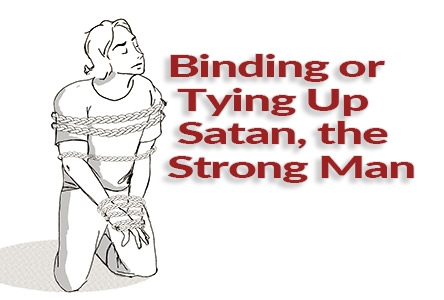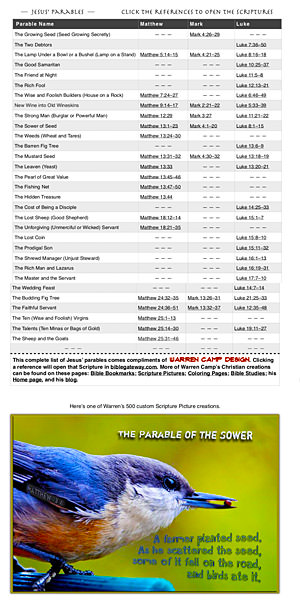
Jesus’ Parable of the Strong Man illustrates the conflict between the kingdom of heaven and the kingdom of darkness. The strong man who owns the house is Satan; today’s world is his house; his possessions are people.
In his parable, Jesus likens himself to a robber. Just as a robber breaks into a home and ties up its strong homeowner while carrying off his possessions, Jesus bound the strong adversary and carried away the people. By freeing demon-possessed people from spirits that afflicted them, Jesus was robbing the possessions of the strong man’s house.
Found in all three synoptic gospels, this parable forms part of the Beelzebul controversy, where Jesus’ opponents accused him of gaining his power to exorcise demons by being in the same league as Satan.

† Find Warren’s short summary at the bottom of page.


Click the list or the “bird” to enlarge and use Warren’s list of forty-four of Jesus’ parables (a PDF file with links to Scriptures).
Start Reading Warren’s Commentary . . .
Find his summary at the bottom.
par•a•ble [noun] a simple story used to illustrate the meaning of or a moral or spiritual lesson, as told by Jesus in the gospels
synonyms: allegory, moral story/tale, fable
Jesus’ Parable of the Strong Man
Matthew 12:22–37; Mark 3:20–29; Luke 11:14–23; 12:10
The parable of the strong man appears in Matthew, Mark, and Luke’s gospels, with some variations in wording and context. Here’s how each gospel portrays this parable:
† Matthew’s Account Matthew places this parable in the context of Jesus responding to accusations that he was casting out demons by the power of Beelzebul (Satan). The parable serves to illustrate that Jesus is actually opposing and defeating Satan, not working with him.
† Mark’s Account Like Matthew, Mark includes this parable as part of Jesus’ response to the Beelzebul controversy. The context and interpretation are essentially the same as Matthew’s.
† Luke’s Account Luke also places this parable within the Beelzebul controversy, but provides more detail about the strong man being armed, and the attacker being stronger.
Common Interpretation In all three gospels, the parable is commonly interpreted as follows:
° The strong man represents Satan. ° The attacker (someone stronger) represents Jesus. ° The house and goods represent the world and people under Satan’s control. ° The binding and plundering represent Jesus’ defeat of Satan and the liberation of people from his influence.
This parable serves to illustrate Jesus’ power over evil forces and his mission to rescue humanity from Satan’s dominion. The slight variations in wording and detail across the gospels don’t significantly alter the core meaning of the parable.
All of the essential elements of the Parable of the Strong Man are covered in the following commentary. This video presentation, highlighting all three gospel accounts, does a great job of putting this parable or riddle into context.
Jesus speaks the Parable of the Strong Man to the Pharisees.
The Parable of the Strong Man
A Story about Jesus’ Attack of the Strong Man — Satan
Matthew 12:22–37; Mark 3:20–29; Luke 11:14–23; 12:10
Jesus spoke this parable during an encounter between him, “the scribes who came down from Jerusalem” (Mark 3:22), and “the Pharisees” (Matt. 12:24). Scribes differ from Pharisees, although some scribes were presumably Pharisees. Scribes were Israelites who had knowledge of the Mosaic Law and could draft legal documents; every village had at least one scribe. Pharisees were Israelites who were members of a religious party that believed in the “resurrection of the dead” and in following “legal traditions of their fathers,” as opposed to those traditions ascribed to the Bible; historically, most Pharisees were small landowners and traders, not professional scribes.
In Mark’s view, Jesus’ main adversaries in Galilee were scribes, but, according to Matthew, they were Pharisees. These apparently conflicting views can readily be reconciled: Men knowledgeable about Jewish law and tradition would have scrutinized Jesus carefully, and it’s likely that both scribes and Pharisees challenged his behavior and teaching, as both gospels indicate (e.g., Matt. 9:11; 12:2; Mark 2:6, 16; 3:22).
Although the scribes (in Mark’s account), the Pharisees (in Matthew’s account), and the crowd (in Luke’s account) had just seen Jesus cast out demons, that miraculous act of his failed to stimulate and develop their belief in Jesus being their Messiah. Rather, they’d charged the Lord with operating under the power and authority of Satan (Beelzebul) after they saw Jesus exorcise evil spirits and heal the oppressed. Their argument was that “by the prince of demons (Satan) he is driving out demons” (Mark 3:22). In other words, the reason the demons listened to Jesus was that they were in the same league as Jesus was and recognized him as their commanding officer, so to speak. Their failure to believe in who and what Jesus was documents a spiritual problem in the scribes’ hearts. For us today, no matter how much evidence we’re given for the works of God and the identity of Christ, we don’t believe unless we’re granted new hearts that have the ability to accept and submit to the Lord’s revelation.
Jesus’ response to the scribes and Pharisees indicates that his work was unlike that which other Jewish exorcists performed in those days. He refuted their blasphemous argument with plain logic: “How can Satan cast out Satan?” (Mark 3:23). Jesus rebutted the Pharisees with some logical arguments for why he wasn’t casting out demons using Satan’s power (Matt. 12:25–29). Then he spoke of the blasphemy against the Holy Spirit: “I tell you, every kind of sin and slander can be forgiven, but blasphemy against the Spirit will not be forgiven. Anyone who speaks a word against the Son of Man will be forgiven, but anyone who speaks against the Holy Spirit will not be forgiven, either in this age or in the age to come” (vv. 31–32). He immediately told them his Parable of the Strong Man that the video above highlights clearly.
In his response to the scribes, Jesus first spoke of the principle of a “divided kingdom” that cannot stand (Mark 3:24–26). Then he told them, “No one can enter a strong man’s house without first tying him up. Then he can plunder the strong man’s house” ( v. 27). Jesus refers to Satan as the “strong man” and to himself as the One who enters the house and plunders the place. Of course, before Satan allows his domain to be “plundered,” he must become incapacitated. Jesus wasn’t in Satan’s league, as the scribes suggested, but had come to the earth, which is essentially Satan’s “house” (1 John 5:19) to bind Satan and then plunder his “goods,” which are the souls of men (Luke 14:18; John 17:15; Ephesians 4:8).
Satan’s kingdom was crumbling; Christ had been effectively attacking its very foundations; there was absolutely no way that he could have needed to operate under the devil’s auspices! Our Lord Jesus’ God-enabled victories have been so thorough that if he’d been an agent of Satan, the devil would have been in the position of destroying himself (Mark 3:22–26). Even Satan wasn’t that foolish. Christ was clearly against Satan then, as much as he is today.
In Mark’s account, Jesus furthered his argument against the scribes’ charges by noting that his success was due to his binding (or tying with rope) the “strong man” — Satan — and plundering the devil’s house (v. 27) of his possessions: people. First-century Jews expected the Messiah to “bind the devil.” We see in Isaiah 49:24–26 that God promised to capture the prey of the enemies of his people. Isaiah foresaw a day when the Lord would act decisively to redeem his people and take back what their foes had taken. Isaiah 49 is about the Servant of the Lord; in that chapter we see that this recapturing of what had been lost was a required task of the Servant, the same individual who atoned for the sins of his people (Isa. 53). So, in binding this strong man, Satan, and taking back what that obnoxious enemy had claimed for himself, Jesus proved his messianic calling, demonstrating that he was indeed the one through whom God brings salvation.
The scribes were wrong: Jesus’ exorcisms weren’t acts of Satan! They were part of a divine rescue mission wherein the Lord liberated men and women from evil Beelzebul’s grasp. Today, we see the Jesus’ work in action, every time a person’s sinful nature is redeemed by the power of the gospel.
In God’s Presence
Don’t underestimate the power and influence of Satan. Neither should we fear him. He’s the strong man whom Jesus has bound; yet, he’s unable to hold on to what rightfully belongs to God and his people. We Christ-followers can testify confidently about how the gospel personally assures us of our salvation; we know that the Lord will use this good news to liberate sinners from the devil’s snare. When we remain very trusting in Christ, we know assuredly that we’re on his side. He’ll give us victory over the devil and all his henchmen. So, going forward, strive to put and keep Beelzebul behind you so you can successfully continue to follow Jesus who’s in front of you, leading your way.
Note: The Bible doesn’t give Christians the authority to rebuke the devil — we’re to resist him (James 4:7). Some Christians believe they not only have the authority to rebuke the devil, but that they must also make every effort to continually do so. There’s no biblical basis for such a belief. Satan, unlike God, is not omnipresent. He can only be in one place at a time; the likelihood of his personally harassing individual Christians is minuscule. But, he has legions of demons who do his bidding; they’re everywhere, seeking to destroy believers’ testimonies. God has allowed Satan significant amounts of power and influence over the earth, at least for now, and always within God’s sovereign control.
Conflict Between Two Kingdoms
In his Parable of the Strong Man, Jesus gives six reasoned arguments when he answered the scribes’ and Pharisees’ accusations.
- It would be absurd for Satan to oppose himself. Why would he send out demons to torment men and then make Jesus drive out the demons? To divide his resources against himself would cause his kingdom to fall.
- Jesus asked them about the Jewish exorcists whom they endorsed. If the religious leaders approved of them allegedly driving out demons, but with the same result as Jesus, what was their source of power? How could they be seen as doing God’s work while Jesus was being viewed as having needed to use Satan’s power?
- The third argument (as shown in Matthew’s and Luke’s accounts only) identifies the true source of Jesus’ power: “But if I drive out demons by the Spirit of God. . .” (Matt. 12:28a). This shows the absurdity of the previous suggestion that Jesus was using Satan’s power. Realize that “if” Jesus’ power source had been the Spirit of God, it would be consistent with how he continually lived his life: under the Spirit’s power and direction.
- The parable itself provides essential reasoning. The “strong man” (representing Satan), is strong and armed for battle. “His house” represents his (dark) kingdom, a realm of evil, misery, and death. In his house he has “possessions,” probably seen as being people under his control. Like the “demon-possessed” man, the people were Satan’s possessions. Jesus is the “stronger man” who attacked and overpowered the “strong man,” tying him up and taking his possessions. He’d just freed a man from Satan’s possession.
- It comes down to the matter of one’s allegiance: “He who is not with me is against me...” (Matt. 12:30a; Luke 11:23a). A deliberate choice must be made; being indecisive about believing in and following Jesus amounts to being against him.
- Jesus’ sixth argument amounts to being a warning about unforgivable sin. Every sort of sin and blasphemy is forgivable, excepting one’s blasphemy of the Holy Spirit. God will never accept or forgive such a grievous act (Luke 12:10).
A Hearty Way to Apply This Parable Today
In order to effectively weaken an enemy’s power in any battle, the strong opponent must first be bound or tied up. While we cannot do this by ourselves, we must collaborate with the Spirit of Jesus as we help fulfill God’s eternal plan. Once the enemy has been tied up, the Spirit can plunder and take control of his house (or realm or kingdom). Those of us who learn these practical and spiritual principles — and continually call on the Holy Spirit to put them into action for us — will be victorious over Satan; that’s a fact he knows all too well.
We need to understand and fully appreciate that binding the strong man doesn’t mean we’re eradicating all the evil in this world. We know that Jesus is the only one who can and will do that. However, when we expose the strong man, and eliminate him from the equation, we remove every bad influence from our lives, the lives of our families, our businesses, our finances, our cities, our nation, and more.
Jesus told his disciples, “I will give you the keys of the kingdom of heaven; whatever you bind on earth will be bound in heaven, and whatever you loose on earth will be loosed in heaven” (Matt. 16:19). We open the doors to the kingdom of heaven by using the authoritative words that God has placed on our lips. Using that authority and power of Jesus’ Spirit, we’re able to “bind the powers of the enemy” who’s the adversary operating in the spiritual realm. Everything bound in the spiritual atmosphere is also bound here on earth.
Who can bind? Nowhere in God’s Word does Jesus encourage or instruct us to bind the strong man; neither does he suggest how to do it. Instead, realizing that only Jesus has the requisite power and authority to bind Satan, so long as you have full faith in Jesus Christ, you can rest assured that his Spirit in you will bind evil and loose God’s plans, again and again.
Why do we bind? Jesus commented on the need to bind evil, explaining in this parable that the strong enemy must be bound before his house or kingdom can be plundered. “Or again, how can anyone enter a strong man’s house and carry off his possessions unless he first ties up the strong man? Then he can plunder his house” (Matt. 12:29).
When to bind or loose? When we face an evil stronghold in life, we’re obliged, as children of God, to first call upon and use our inherited authority — the powerful Holy Spirit — to bind the evil forces involved. After that, God’s plans for restoration can be loosed or called forth. When we bind something, we declare it unlawful (or evil) based on God’s Word. As co-heirs in Jesus Christ, we have his authority to work against evil forces (Psalm 149:5–9). And, as Jesus warns us in the closing verse of Matthew’s account of the Parable of the Strong Man, every one of us must give our personal account to God on the day of judgment “for every empty word we have spoken.” Realize this: There will be a time of reckoning. Words are powerful; take them seriously! Words can be your salvation; they can also be your damnation. Every one of our empty, careless words is going to come back to haunt us (Matt. 12:37).
May we pray a binding prayer? “Father, I thank you for sending your Son, Jesus, to die for me, resurrecting him to now sit at your right hand in heaven. I also thank you for bestowing upon Jesus all power and authority over evil. In his name I speak to evil spirits, especially spirits of ___________, ___________, and ___________ ( fill in the blanks). Enable me to bind every evil spirit in my life so that I can prevent its attacking me today. Empower me now to ask Christ Jesus to eradicate every evil spirit. Knowing that I’m covered and protected by Christ’s blood, I thank you Lord for delivering me. Amen.”
“. . . but whoever blasphemes against the Holy Spirit will never be forgiven; they are guilty of an eternal sin” (Mark 3:29).

Take our “Parables Quiz.”
See Warren’s other “Parables of Jesus” commentaries.
— Warren’s Concise Summary —
The Parable of the Strong Man, told by Jesus in the three synoptic gospels, illustrates the spiritual conflict between Jesus and Satan. In this short story, the “strong man” represents Satan, who guards his possessions — meaning people held under his power — in his “house,” the world. Jesus, depicted as someone stronger, enters, binds the strong man, and “plunders” his house, freeing those held captive.
The parable demonstrates that Jesus’ authority and power over evil surpass Satan’s, and it was presented in response to accusations that Jesus cast out demons by Satan’s power; instead, it affirms that Jesus had come to defeat and liberate humanity from Satan’s dominion.

